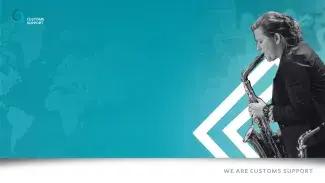In this edition, we are excited to present Anke Huijs, who is our manager for customs and compliance for The Netherlands.
Join us as Anke shares her experience and insights in this article.
Who are you?
My name is Anke and I was born and raised in a small village near Venlo, in Limburg in the south of the Netherlands, where I still reside to this day, in an aged farmhouse amongst the fields and forests.
I have been working Customs Support Venlo (previously known as Verhoex prior to the acquisition) for 14 years. As per 2022 I was promoted to customs & compliance manager for the Netherlands.
What does a customs and compliance manager do?
As the customs and compliance manager, I and my team make sure we stay up to date with legislation – as well as any upcoming changes to legislation. This is so that we can prepare our operational colleagues and our customers as much as possible.
In particular, we monitor declaration flows to and from high-risk restricted countries, such as Russia and Belarus. We provide guidance to operational teams on optimising customs clearance and resolving complex shipment issues. We also closely monitor developments in IT and digital developments, which may require adjustments to internal processes or staff readiness.
What's your typical working day like?
My mornings kick off with a needed dose of caffeine along with a review of new messages in both my personal inbox and our shared team email. Scanning these communications allows me to prioritize responding to pressing client inquiries, address internal requests, and ensure any relevant information is shared with my colleagues to set us up for a productive workday ahead.
We don’t only look into customs-related news, but also world news. Developments in the world can ultimately lead to changes in customs legislation or shift our focus in terms of controls.
This includes information such as trade concessions with Ukraine, sanctions on metal goods from Russia, the need for humanitarian aid to Türkiye and Syria, or the position of the EC on electric cars.
After reading and understanding this information, I discuss this with the team and we see whether we should share the information with the organisation. And, it’s important to look at how we share information – we need to determine if an email is sufficient, if we should write a compliance memo, if a work instruction is required, or even if it warrants a short meeting with the team leaders.
Of course, there are also consultations with other departments and colleagues across the organisation. As a team, we try to set up our structure in the best way. Not only in customs terms, but also in the process on the shop floor. We try to assess risk based on procedures and process diagrams, and continue to reduce that risk in consultation with the departments involved.
Have you always worked on the compliance side of customs?
Not really. When I graduated from the Integrated Safety course 13 years ago, I was given the opportunity to start administrative work at Verhoex. Initially, my role was to register authorisations and process customer data.
After a while, I started counting out declarations for the declarants and then it was time to start the training to become a declarant. I began working in the customs clearance department at Verhoex as a declarant, and gradually I managed some more difficult declarations and started writing requests.
When Brexit became final, I was offered to participate in the Dutch Brexit project. After completing this, I was given a role in the national Compliance team, and ultimately the position as customs and compliance manager in 2022.
What do you like most about working in compliance?
First of all, I like working in a team! Not only with the compliance team, but also with all declarants, team leaders, management in the Netherlands and in Europe. Brainstorming together about complex customs matters and working to arrive at the right solution.
And, I like the structure of legislation and rules and guidelines. Despite the fact that this is often heavy and difficult expense, it gives a lot of satisfaction when we set up something internally or with a customer that allows us to comply with legislation.
What do you like about working with a Europe-wide network of customs experts?
Even though we are a single market, every member country still has its own rules and implementation of legislation. In some cases, it is frustrating that things are not yet equal in all countries through the EU. However, this has created a wealth of experience within Customs Support that we can draw on.
The group compliance team periodically organises meetings with all compliance managers in Europe. During these meetings, we exchange insights and look at how we can support each other. Because of these meetings, we also know who to find outside of the meetings to discuss issues.
We get a lot of input on top-level challenges like the introduction of CBAM reporting or how classification can affect your CBAM obligations.
What do you like to do when you aren’t at work, and how does that influence your work skills?
In my spare time I like to go for walks in nature and, especially during the holidays, I can usually be found at a campsite in a tent. Whilst walking, I have enough time to enjoy nature, and also like to listen to music or podcasts.
I am also an enthusiastic amateur musician. I play the saxophone (alto and soprano) at the local fanfare band, I like to sing, and I bought a guitar a few years ago and learned some chords via YouTube. It’s very nice to occasionally make some music in a campfire setting.
What playing in a band has taught me is that it is always about the bigger picture and never about a person. Someone may be a soloist or the best musician, but without fellow musicians the soloist is nowhere and being the 'best' is of no use. You must strive to do well, but then also help others who have more difficulty, so that the big picture improves.
This also be applied to Customs Support and compliance. Compliance teams may have a lot of knowledge, but the goal is to spread that knowledge throughout the organisation and use it so that our customers benefit from it.
In your opinion, what is the most important thing a client should look for in a customs partner?
Compliance, of course – complying with laws and regulations. A customer can always ask to receive the declaration faster or for a lower price, but ultimately the best help is a good declaration. That is the goal that compliance always strives for.
You work with a Europe-wide network. If you were to visit a country of Customs Support, where would you go and why?
I want to visit all of my colleagues, but I think my first visit would be to Finland. I love the snow and cold, and I can’t think of a better place to visit in winter.














